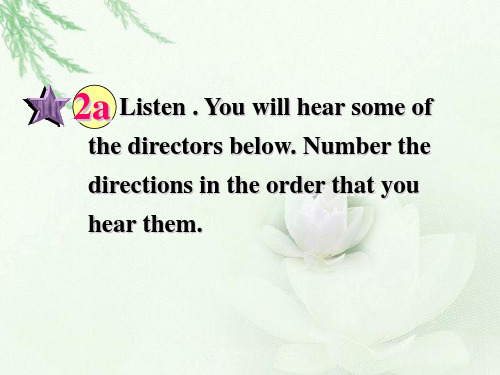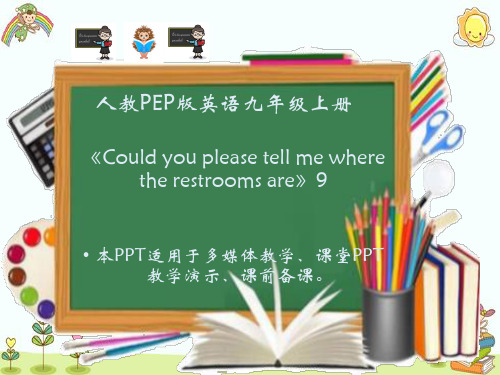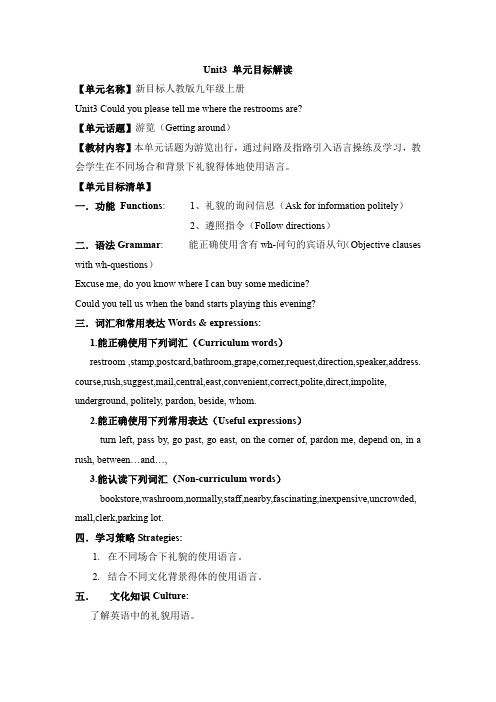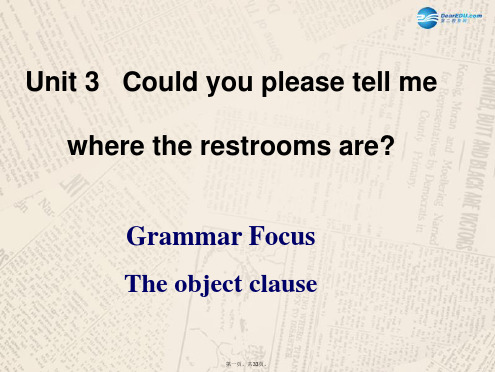英语人教版九年级全册Could you please
- 格式:docx
- 大小:12.25 KB
- 文档页数:4




Unit3 单元目标解读【单元名称】新目标人教版九年级上册Unit3 Could you please tell me where the restrooms are?【单元话题】游览(Getting around)【教材内容】本单元话题为游览出行,通过问路及指路引入语言操练及学习,教会学生在不同场合和背景下礼貌得体地使用语言。
【单元目标清单】一.功能Functions: 1、礼貌的询问信息(Ask for information politely)2、遵照指令(Follow directions)二.语法Grammar: 能正确使用含有wh-问句的宾语从句(Objective clauses with wh-questions)Excuse me, do you know where I can buy some medicine?Could you tell us when the band starts playing this evening?三.词汇和常用表达Words & expressions:1.能正确使用下列词汇(Curriculum words)restroom ,stamp,postcard,bathroom,grape,corner,request,direction,speaker,address. course,rush,suggest,mail,central,east,convenient,correct,polite,direct,impolite, underground, politely, pardon, beside, whom.2.能正确使用下列常用表达(Useful expressions)turn left, pass by, go past, go east, on the corner of, pardon me, depend on, in a rush, between…and…,3.能认读下列词汇(Non-curriculum words)bookstore,washroom,normally,staff,nearby,fascinating,inexpensive,uncrowded, mall,clerk,parking lot.四.学习策略Strategies:1.在不同场合下礼貌的使用语言。


教学过程一、课堂导入通过Could you please tell me …? 这一句型来询问学生如何做事或让学生之间互相询问,复习本节课所需句型。
二、复习预习1. We treat dogs ____________ our friends.A. asB. forC. ofD. in【答案】A【解析】本题考察介词搭配,“把……当……对待”用treat sb. as/like…,故选A。
2. Mr. Mao ____________ for 35 years.A. diedB. dyingC. has been deadD. death 【答案】C【解析】本题考察现在完成时,“死”的延续式是be dead。
3. Not only Tom but also Mike __________ English very much.A. likeB. likesC. to likeD. liked【答案】B【解析】本题考察not only … but also…做主语,谓语动词采用“就近原则”。
4. We all went to the park __________ Tom. We played happily together.A. besideB. besidesC. exceptD. by【答案】B【解析】本题考察介词,根据句意:除Tom外,我们也都去了公园。
故选B。
5. ---Could you tell me __________?---Yes, there is one between the school and the post office.A. where the bookstore isB. where is the bookstoreC. how far is the bookstore isD. how far the bookstore is【答案】A【解析】本题考察宾语从句,用陈述语序,排除B和C;根据句意选A。
答卷时应注意事项1、拿到试卷,要认真仔细的先填好自己的考生信息。
2、拿到试卷不要提笔就写,先大致的浏览一遍,有多少大题,每个大题里有几个小题,有什么题型,哪些容易,哪些难,做到心里有底;3、审题,每个题目都要多读几遍,不仅要读大题,还要读小题,不放过每一个字,遇到暂时弄不懂题意的题目,手指点读,多读几遍题目,就能理解题意了;容易混乱的地方也应该多读几遍,比如从小到大,从左到右这样的题;4、每个题目做完了以后,把自己的手从试卷上完全移开,好好的看看有没有被自己的手臂挡住而遗漏的题;试卷第1页和第2页上下衔接的地方一定要注意,仔细看看有没有遗漏的小题;5、中途遇到真的解决不了的难题,注意安排好时间,先把后面会做的做完,再来重新读题,结合平时课堂上所学的知识,解答难题;一定要镇定,不能因此慌了手脚,影响下面的答题;6、卷面要清洁,字迹要清工整,非常重要;7、做完的试卷要检查,这样可以发现刚才可能留下的错误或是可以检查是否有漏题,检查的时候,用手指点读题目,不要管自己的答案,重新分析题意,所有计算题重新计算,判断题重新判断,填空题重新填空,之后把检查的结果与先前做的结果进行对比分析。
亲爱的小朋友,你们好!经过两个月的学习,你们一定有不小的收获吧,用你的自信和智慧,认真答题,相信你一定会闯关成功。
相信你是最棒的!Unit 3 Could you please tell me where the restrooms are?初中英语单词背诵【默背小卷】学校:___________姓名:___________班级:___________考号:___________一、根据首字母填空1.It’s i________ for each of us to speak loudly in public places.2.The sun rises in the e________ and sets in the west.3.Please tell me your a________. I will go to visit you tomorrow.4.—Could you tell me where I can buy some s________?—There is a post office across from the hospital.5.Mike, please tell me your a ________. I want to mail a new CD to you.6.It is i______ to point at others with your fingers.7.It’s c________ to take the No.18 subway to Chengdu Tianfu International Airport.8.Don’t talk with your mouth full because it’s i______.9.Let’s meet at my home. I’m give you my home a________.10.— I am hungry. Do you know where we can get some good food quickly?— Of course. I s________ Water City Restaurant in Water World. It serves delicious food.11.The e________ is the direction where the sun rises.12.It's i________ to point at strangers and talk about them in public.13.I live near a supermarket. It's c________ for us to buy something there.14.Mary, would you please tell me your new a________ so that I can write to you?15.The young man p_______ offered his seat to an old woman. That made her happy.16.He read the name and address on the new year p______ with a snow picture on it. It’s from Jack, a pen pal of Canada.17.I live near the supermarket, so it's very c_________ to go shopping there.18.He grew up in this small town and of course, he knew every c______ of the town.19.As the famous saying goes, e________ or west, home is the best.20.“To w_______ does this book belong?” The teacher asked and tried to find the owner.21.The development of modern technology like smartphones and the internet has made communication more c__than ever before. We are able to contact people easily whenever we want.22.In China, we n________ say “toilet” or “washroom” in English.23.It’s i________ for people to talk loudly in public, please be quiet.24.We always need to make requests for d______ if we get lost in a new city.25.Just sit b______ me, don’t sit before me or behind.26.It's important to know how to ask for help p________.27.There are some shopping malls around the neighborhood, so it's c___ for us to go shopping. 28.Nick walked up to the old man and p ________ said sorry since he broke the windows.29.We should a________ making any noise in the reading room.30.U_____________you work hard, you will not succeed.31.He gets up early and exercises every day. It's a good h___________.32.The sun r________in the east and sets in the west.33.I think it p________ to knock at the door before entering the room.34.Whether we’ll have a good time depends on w___ we are going with and where we are going. 35.Mike s_______ going hiking this weekend. What’s your idea?36.Your answer is not c_______. There must be something wrong with your calculators (计算). 37.It’s not enough to just ask a question correctly. We also need to learn how to speak p____________ when we ask for help.38.An E-bicycle is often more c__________ than a car in cities.39.The boy s________ Water City Restaurant in the Water World, because it serves delicious food and is very popular.40.The expressions they use might depend on w__________ they are speaking to or how well they know each other.41.Tom invited Mary to go to the cinema with him, but Mary refused p__________.42.The hotel is near the subway station. It's quite c_______ to take the subway to go everywhere. 43.Asking direct questions may sound i_______.44.P________ used to be very popular for tourists to send by mail to their families and friends. Now they aren’t any more.45.The expressions people use may depend on w________ they are speaking to or how well they know each other.46.I live just by the market, and it’s very c________ for me to go shopping.47.We are looking for somebody with a clear sense of d________ as our guide48.Could you please tell me your e-mail a______?49.P___________ me, could you please tell me where to park my car?二、根据汉语提示填空50.In our daily life, it’s important to know how to ask for help ______ (礼貌地).51.People can learn something from collecting ________(邮票)and each Small picture tells us a story. 52.You’d better not leave your exact _________(地址)online until it’s an official website.53.It is not ________ (礼貌的) to make too much noise while eating or drinking.54.The girl smiled ________ (礼貌), explaining the rules to the customers.55.People here are much ________ (有礼貌的) than those there.56.You should be ________ (礼貌的) to the old.57.It’s important to know how to ask for help in a foreign country, but it’s more important to know how to ask for help ________ (礼貌地).58.There is a mistake in the notebook, you should ________ (改正) it.59.When she offered him the pen, he ________ (礼貌地) refused it.60.Some people think it is ________ (不礼貌的) to ask someone's age.61.The library is on your right, ________(在……旁边)the post office, you can’t miss it. 62.Behaving ________ (礼貌地) brings us a lot.63.People are ________ (礼貌) asked not to touch the painting on show.64. John is ________(感兴趣的)in the film Wolf Warrior II.65.He came from _______(中心的)Jiangsu but now he is used to living in Sichuan.66.These English __________ (speak) from the UK are friendly to us.67.In some places, it isn’t ______ (有礼貌的) to look at people when you talk.68.The pay phone is in __________(前面)of the library.69.Shanghai is in the __________(东方) of China.70.Nothing________ more than people’s safety and health. (要紧)71.________ I get in trouble, I ask Grandma to come over for dinner. (无论何时)72.In autumn, quite a few____________(树叶) turn yellow and fall off the trees.73.When we are in danger, it's very important to make a good ________ (决定).74.That store sells things at high__________ (价格), but they’re really good.75.The more you think about others, the more________ (有帮助的)you will be.76.Thank you for giving me the useful________ (建议)to learn English.77.Being _________ (礼貌的) costs nothing, but it brings a lot.78.This 5-year-old boy has such a good sense of _________ (方向) that he never gets lost.79.Of all the fruits, I like ________ (葡萄) best.80.I want to send Jim a letter. But I don’t know his ____________ (地址).81.It is very ________ (不礼貌) to keep others waiting for a long time.82.Would you like to buy some ________(葡萄)for me?83.With public bikes in the neighborhood, life is getting more and more ________ (方便的). 84.Do you think that people would help you if you ask them for help ________ (礼貌)?85.The 2022 Beijing Olympic Games ___(鼓励)the public to pay attention to winter sports. 86.You should be __________(勇敢)enough to face any difficulties.87.She gave me the new ________ (地址) of the family.88.“Could you please tell me where the bookshop is?” the boy asked ________ (礼貌地).89.I’m sorry to tell you that your ________ (请求) was refused by the manager.90.She buys a box of chocolates in the ________(拐角)store.91.My hobby is collecting ________ (邮票) in my spare time.92.It is very________(方便的)for tourists to take the train in Japan .93.When they went into the forest, the small animals ran in all________(方向).94.She is a_______________(无礼貌的)girl.95.Badminton is to sport as north is to ________.96.Please tell me your home ________ and telephone number so that I can send you the new product. 97.To _____________ are you writing this e-mail now?98.—How do you like the films ________ by Zhang Yimou?—You can get a close look at China through his films.99.The man from ________ I borrowed the book is Li Lei.100.—Philip, how can I improve my spoken English quickly?—I ____ you can listen more and read more. That can improve your pronunciation and intonation.参考答案1.(i)mpolite【详解】句意:我们每个人在公共场所大声讲话是不礼貌的。
Unit 3 Could you please tell me where the restrooms are? 一、教学目标: 1. 语言知识目标 基本词汇:restroom, stamp, bookstore, postcard, pardon, washroom, bathroom, normal, rush, suggest, staff, grape, central, mail, east, fascinating, convenient, mall, clerk, corner, polite, politely, speaker, request, direction, correct, direct, whom, address, underground 基本句型:Excuse me, do you know where I can buy some medicine? Sure. There’s a supermarket down the street. Could you please tell me how to get to the post office? Sorry, I’m not sure how to get there. I wonder where we should go next. Could you tell us when the band starts playing this evening? You should try that new ride over there. 2. 技能目标: (1)能用宾语从句礼貌的寻求帮助。 (2)能用正确的方法指路。 3. 情感目标: 培养学生尊重他人,对人有礼貌,热爱生活。 二、教学重难点: 1. 教学重点:(1)礼貌的向他人寻求帮助。 (2)正确使用宾语从句。 2. 教学难点:运用宾语从句礼貌的寻求帮助。 三、教学步骤: Section A 1 (1a-2d) Step 1 Warming –up Greeting Step 2 Presentation (1)Guessing game Show pictures to the whole class, one student explains the places in English and another one who doesn’t look at the blackboard guesses what place it is. For example, one student say: We can save money or exchange money in this place, another one guess it is a bank. Get students to guess the places like bank, post office, bookstore, museum, bathroom, washroom, mall and so on. (2)Show some stamps to students and present the new sentences: Could you tell me where I can buy some stamps? Could you please tell me where I can get a dictionary? Do you know where I can get some magazines? Step 3 Practice 1) Match each thing with a place in the picture in 1a.
2) Read the phrases. ___ get some money ___ get some magazines ___ have dinner ___ get a dictionary ___ get some information about the town ___ buy a newspaper ___ buy some stamps ___ get a pair of shoes Step 4 Listening Listen and complete the conversations in the picture in 1a. Then check the answers with the whole class. Step 5 Practice Make conversations using the information in 1a. Then talk about your own city. For example: A: Excuse me, could you please tell me how to get to the bookstore? B: Sure, just go along Main Street until you pass Center Street. The bookstore is on your right, beside the bank. A: Thanks. Do you know when the bookstore closes today? B: It closes at 7:00 p.m. today. A: Thank you! B: You’re welcome. Step 6 Listening 1. Listen and number the directions in the order that you hear them. 2a You will hear some of the directions below. Number the directions in the order you hear them. ___ Go to the bird floor. ___ Turn left. ___ Go to the second floor. ___ Turn right. ___ The supermarket is between the flower store and the bookstore. ___ Go past the bookstore. 2. Listen again. Show how the boy walks to the supermarket. Draw a line in the picture in 2a. Then get one student draw the line on the blackboard.
3. Listen the third time and answer the questions. 1) Excuse me, can you tell me where I can buy some medicine? 2) Do you know how to go there? 3) OK, great. Oh, and one more thing. Do you know when this shopping center closes tonight? 4) OK, thanks a lot. Step 7 Pairwork Make conversations about the other places in the picture in 2a. A: Excuse me. Can you tell me where I can buy some stamps? B: Yes, there’s a post office in this shopping center. A: Do you know how to go there? B: Yes. Go to the third floor and turn right. Then go past the bank. The post office is between museum and library. You should be able to get stamps. A: OK, great. Oh, and one more thing. Do you know … B: I’m not sure, but you … A: OK, thanks a lot. B: You’re welcome. Step 8 Reading 1. Read the conversation in 2d and answer the questions. 2. Role – play the conversation. 3. Explain the language pints in 2d. (1) Go along Main Street until you pass Center Street. 1) until和 till同义为“直到……” ,till多用于口语,until可以放在句首,till则不能放在句首。 2) not...until“直到……才”,表示直到某一时间, 某一行为才发生, 之前该行为并没有发生。 e.g. I did not study English until 9 o'clock last night. (2) Pardon? Restroom? You already want to rest? But we haven’t even started yet! 1) pardon用作动词,后面既可以跟宾语,也可以跟双宾语;pardon sb. for doing sth.意为“原谅/宽恕某人做某事” e.g. Can you pardon me for not passing the exam, Mom? 2) 在没有听懂对方的话,请对方重复一 下时也可说 pardon。 e.g. Pardon? I’m sorry I can’t follow you. (3) I’m excited to try the rides! excited和 exciting的区别: 1) excited意为“激动的;兴奋的”,作表语时,主语通常是人;作定语时,常用来修饰人,说明激动的表情。 e.g. All of us were excited when we heard the good news. The excited child opened his present quickly. 2) exciting意为“激动人心的”,作表语时,主语通常是物;作定语时,常用来修饰物。 e.g. The movie is very exciting. My father told me an exciting story. (4) I mean … you know, a washroom or bathroom. mean作动词有以下含义: 1) 有……的意思,指(多作及物动词),其后可跟名词或代词,也可跟从句。 e.g. What does this word mean? 2)意味(着)(及物动词),常跟名词,有时可跟动词-ing形式或从句。 e.g. Carl really could not do that — it would mean the end of his career. 3)有……意图,打算,想,常跟名词、代词或动词不定式。跟带不定式 的复合结构时,还可用于被动语态。 e.g. I never meant to hurt you. (5) We normally say “toilets” or “washrooms”. normally adv. 正常地; 通常地,一般地 e.g. August is normally a slow month. (6) Nine thirty, so you don’t need to rush!